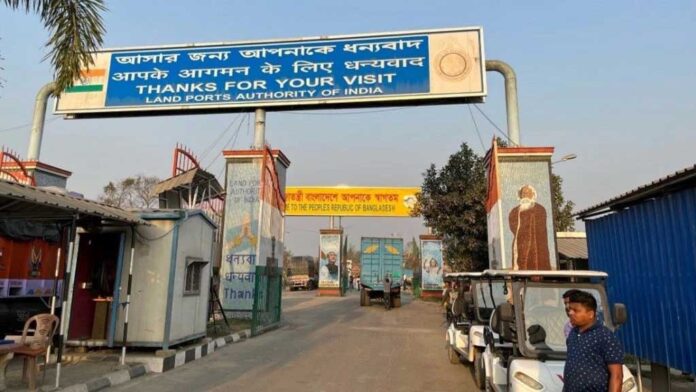India has withdrawn a crucial transit facility that allowed Bangladesh to transport its export cargo to third countries via Indian land customs stations, according to local media reports.
The Central Board of Indirect Taxes and Customs (CBIC) announced the decision on Tuesday, effective immediately, as reported by The Indian Express.
This move follows recent remarks by Bangladesh’s Chief Advisor, Muhammad Yunus, suggesting that China’s economic influence should extend into India’s strategically significant, landlocked northeastern region—a statement that has sparked scrutiny in India.
However, the CBIC clarified that cargo already in transit through India would be allowed to exit as per the now-revoked circular’s outlined procedures.
Introduced in June 2020, the facility enabled Bangladeshi goods destined for third countries, such as Nepal, Bhutan, and Myanmar, to be transshipped through Indian land routes to ports and airports, facilitating smoother exports to neighboring nations.
During his visit to China from March 26 to 29, Yunus referred to Northeast India as “landlocked” and described Dhaka as “the only guardian of the ocean for the entire region.”
India interpreted this remark as an attempt by Bangladesh to assert strategic leverage over access to the northeastern states—a point of contention for New Delhi. Dhaka, however, maintained that the comments were made in good faith.
Assam Chief Minister Himanta Biswa Sarma condemned Yunus’s statement as “offensive” and “strongly condemnable.” In a post on X, he stated that it undermined the “persistent vulnerability narrative” associated with India’s strategically sensitive Chicken Neck corridor.
According to The Indian Express, Ajay Srivastava, a former trade officer and head of the Global Trade Research Initiative (GTRI), noted that India had long supported Bangladesh’s trade interests. He highlighted that for over two decades, India had granted Bangladesh one-way, zero-tariff access to its market, except for alcohol and cigarettes.
Srivastava suggested that Bangladesh’s decision to invite Chinese investment in revitalizing the Lalmonirhat airbase, near India’s Siliguri Corridor, may have influenced New Delhi’s move.
The suspension of the transit facility is expected to disrupt Bangladesh’s export and import operations, particularly affecting trade with Nepal, Bhutan, and Myanmar, which rely on Indian infrastructure for market access. Bangladeshi exporters will likely face logistical challenges, higher transportation costs, and increased uncertainty.
However, Srivastava warned that this decision could conflict with India’s commitments under World Trade Organization (WTO) rules, which mandate the free transit of goods to and from landlocked nations.
“Under WTO regulations, specifically Article V of the General Agreement on Tariffs and Trade (GATT) 1994, all member states must ensure freedom of transit for goods traveling to and from landlocked countries. This requires that transit be unrestricted, free of unnecessary delays, and not subject to transit duties,” he was quoted as saying.



